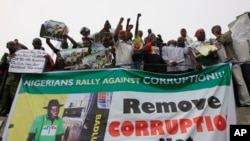A new report finds corruption by public officials remains a major problem in countries across Africa - with one notable exception.
Berlin-based Transparency International surveyed perceived levels of corruption among people in 107 countries, including 24 in Africa.
In 11 African countries, more than half of those surveyed reported paying a bribe within the past year. In Liberia and Sierra Leone, more than three-quarters said they paid a bribe.
Asked which institutions are most corrupt, Africans often singled out the police, the judiciary and political parties. In several countries, including Nigeria, Kenya and Zimbabwe, more than 80 percent said police were affected by corruption.
The strong exception to these trends was Rwanda. According to researchers, 56 percent of Rwandans surveyed said corruption has greatly decreased in the last two years, and less than 15 percent reported paying a bribe. Several institutions - including parliament, the military, and political parties - were judged to be almost corruption-free.
Berlin-based Transparency International surveyed perceived levels of corruption among people in 107 countries, including 24 in Africa.
In 11 African countries, more than half of those surveyed reported paying a bribe within the past year. In Liberia and Sierra Leone, more than three-quarters said they paid a bribe.
Asked which institutions are most corrupt, Africans often singled out the police, the judiciary and political parties. In several countries, including Nigeria, Kenya and Zimbabwe, more than 80 percent said police were affected by corruption.
The strong exception to these trends was Rwanda. According to researchers, 56 percent of Rwandans surveyed said corruption has greatly decreased in the last two years, and less than 15 percent reported paying a bribe. Several institutions - including parliament, the military, and political parties - were judged to be almost corruption-free.






